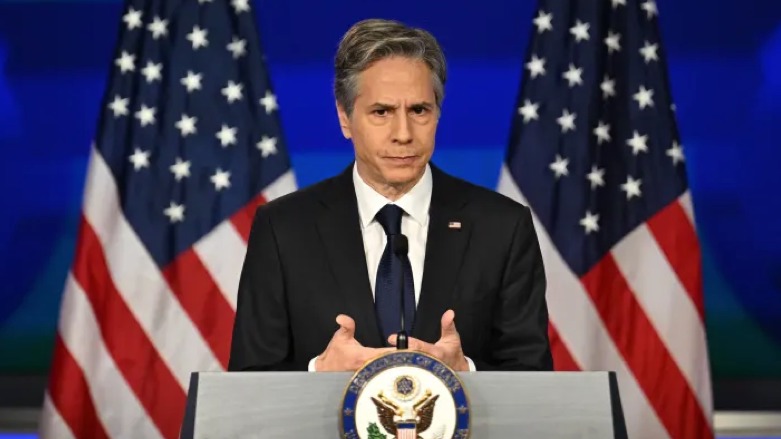U.S. Forming Global Coalition against Synthetic Drugs, including Captagon

WASHINGTON DC, United States (Kurdistan 24) – At the end of last week, the U.S. State Department announced that it was forming a new global coalition to address the threat from synthetic drugs, including the threat from Captagon.
“Captagon trafficking remains a serious problem with significant impacts on the [Middle East] region and across the world,” Deputy State Department Spokesperson Vedant Patel affirmed on Wednesday, as he suggested that the Captagon trade “fuels corruption and stifles economic prosperity.”
Syria is a major producer of Captagon. Authorities in the Kurdistan Region, and in Iraq more broadly, regularly seize large quantities of the drug.
Read More: Over 940 drug traffickers, consumers arrested in Kurdistan Region over five months
Read More: Iraq confiscates 250,000 Captagon pills ‘inside a school’
To launch the new Global Coalition to Address Synthetic Drug Threats, Secretary of State Antony Blinken will host a virtual Foreign Ministers meeting on July 7.
As Blinken explained in a statement released by his office on Friday, “This coalition seeks to unite countries worldwide in a concerted effort to prevent the illicit manufacture and trafficking of synthetic drugs, identify emerging drug trends, and respond effectively to their public health impacts.”
Given the Captagon threat to Iraq, it seems likely that Baghdad will be invited to that meeting, and, particularly if the Coalition meets in person, at least one representative from the Kurdistan Regional Government (KRG) will be included in the Iraqi delegation. That, at least, has been a regular practice in the meetings of another such U.S.-sponsored coalition—namely the Global Coalition to Defeat ISIS.
Responding to a question about such an invitation from Kurdistan 24, a State Department official declined to answer directly, but said, "We have invited 91 geographically, economically, and politically diverse countries and 14 international organizations to the July 7 Ministerial.”
China, Mexico, and Fentanyl
For the U.S., fentanyl, a synthetic opioid, poses the greatest threat. It is a “highly addictive synthetic opioid that is 50 times more potent than heroin and 100 times more potent than morphine,” the Department of Justice recently explained.
The U.S. Centers for Disease Control and Prevention (CDC) estimates that in 2022, overdoses of fentanyl killed some 110,000 Americans, while the drug is the leading cause of death for Americans between the ages of 18 and 49.
Typically, the precursor chemicals for the production of fentanyl sold in the U.S. are produced in China and shipped to Mexico, where the drug is manufactured. Until recently, U.S. authorities had limited their efforts to counter fentanyl to the pursuit of the producers of the drug in Mexico.
Yet on the same day that Blinken announced the formation of the Coalition against Synthetic Drugs, Washington took an additional step. It began to go after the Chinese producers of the precursor chemicals for fentanyl.
On Friday, the Justice Department announced that it had arrested two individuals and indicted three Chinese companies. “These indictments,” a statement from the Justice Department explained, “represent the first prosecutions to charge China-based chemical manufacturing companies and nationals of the People’s Republic of China (PRC) for trafficking fentanyl precursor chemicals into the United States.”
Syria and Captagon
Last fall, the Carnegie Endowment for International Peace produced a major report titled, “The Al-Assad Regime’s Captagon Trade.” The problem in the Middle East is not so much fentanyl, but Captagon.
As the Carnegie report explained, “Captagon is a brand name for the drug compound fenethylline hydrochloride,” which was “originally produced by West Germany in the 1960s” as a treatment for various psychological disorders. But the drug, an amphetamine-like stimulant, “was banned in the 1980s, because of its addictive effects,” although “soon after, counterfeit Captagon pills began to appear in various countries in the Middle East.”
The Syrian regime, Carnegie said, “has transformed war-torn Syria into one of the world’s leading narcotics enterprises, boasting ports connected to shipping corridors in the Mediterranean in addition to land smuggling routes to Jordan, Lebanon and Iraq—all of which enjoy the protection of the regime’s security apparatus.”
Local forces, supported by Damascus, like Lebanese Hizbollah, are also involved in the drug trade, the Carnegie report stated.
It also explained that the Syrian regime’s extensive involvement in the drug trade stems, in significant part, from U.S. sanctions. “Drug trafficking provides an alternative source of income that supports part of [the regime’s] institutional obligations and finances its ongoing war,” the report said.
And it is, indeed, a profitable business. The highly-regarded German news magazine, Der Spiegel, estimated that in 2021, the Assad regime sold $5.7 billion worth of illicit drugs.
